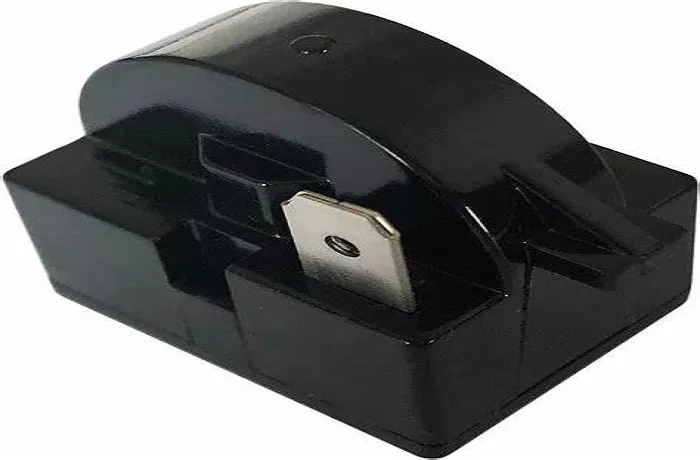The compressor relay is a critical component in a refrigerator’s cooling system. It plays a vital role in starting and protecting the compressor, which is the heart of the refrigeration cycle. Understanding where the compressor relay is located, how it functions, and how to troubleshoot it can help technicians and DIY enthusiasts diagnose and repair refrigerator malfunctions efficiently.
The Function of the Compressor Relay
- Starting the Compressor: The relay provides the initial surge of electricity needed to start the compressor motor.
- Protecting the Compressor: It prevents damage by cutting off power if the compressor overheats or draws excessive current.
Without a functioning relay, the compressor may fail to start or sustain damage due to electrical overload.
Types of Refrigerator Relays
PTC (Positive Temperature Coefficient) Relay
- Uses a thermistor that heats up and increases resistance to cut off the start winding after the compressor starts.
- Commonly found in modern refrigerators.
- No moving parts, making it more reliable.
Electromagnetic (Current-Type) Relay
- Uses a coil and switch mechanism to engage/disengage the start winding.
- Found in older refrigerator models.
- More prone to wear and failure due to mechanical components.
Solid-State Relay
- Uses electronic components instead of mechanical switches.
- Highly efficient and durable.
- Mostly used in high-end refrigerators.
Knowing which type of relay your refrigerator uses helps in troubleshooting and replacement.
Common Locations of the Compressor Relay
The compressor relay is always located near the compressor, which is typically at the back or bottom of the refrigerator. The exact location depends on the refrigerator model.
Compressor Compartment (Modern Models)
- In newer models, the relay is often housed inside a plastic or metal box attached to the compressor.
- May require removing a cover or unplugging the refrigerator for access.
Side or Bottom Panel (Built-in or Cabinet Models)
- Some built-in refrigerators have the relay located on the side or beneath the unit.
- Requires sliding the refrigerator out or removing a bottom kick panel.
To locate the relay precisely, consult the refrigerator’s service manual or check for a wiring diagram on the back panel.
Step-by-Step Guide to Accessing the Compressor Relay
Step 1: Unplug the Refrigerator
- Always disconnect power before working on electrical components to avoid shock hazards.
Step 2: Locate the Compressor
- Move the refrigerator away from the wall.
- The compressor is a black, cylindrical component with copper tubing connected to it.
Step 3: Identify the Relay Housing
- Look for a small plastic or metal box attached to the compressor or nearby.
- Some relays are clipped directly onto the compressor terminals.
Step 4: Remove the Cover or Clip
- Use a screwdriver to remove any screws holding the relay cover.
- If it’s a clip-on relay, gently pull it away from the compressor terminals.
Step 5: Inspect the Relay
- Check for signs of burning, corrosion, or loose connections.
- If the relay is a PTC type, it may appear as a small disc with wires attached.
Once accessed, you can test or replace the relay as needed.
Testing and Troubleshooting the Relay
- Clicking sounds without compressor start-up
- Overheating compressor
- Refrigerator not cooling
Testing a PTC Relay
- Visual Inspection: Look for cracks or burn marks.
- Resistance Check: Use a multimeter to measure resistance across the relay terminals. A good PTC relay should show low resistance when cold and high resistance when warm.
Testing an Electromagnetic Relay
- Listen for Clicking: A working relay should click when power is applied.
- Continuity Test: Use a multimeter to check for continuity between the relay’s contacts.
Replacing a Faulty Relay
- Purchase an identical replacement relay (check model number).
- Disconnect the old relay and install the new one in the same orientation.
- Secure all connections and restore power to test.
Safety Precautions When Handling the Relay
- Always unplug the refrigerator before servicing.
- Avoid touching live terminals to prevent electric shock.
- Use insulated tools when testing electrical components.
- Do not force connections—relays should fit snugly without excessive pressure.
Conclusion
The compressor relay is a crucial part of a refrigerator’s operation, ensuring the compressor starts and runs efficiently. It is typically located near the compressor, either mounted on the back panel or housed in a protective casing. By following proper safety measures and testing procedures, you can diagnose and replace a faulty relay, restoring your refrigerator’s cooling performance.
For complex issues, consulting a professional technician is recommended. However, with this guide, you now have the knowledge to locate, inspect, and troubleshoot the compressor relay like an expert.

